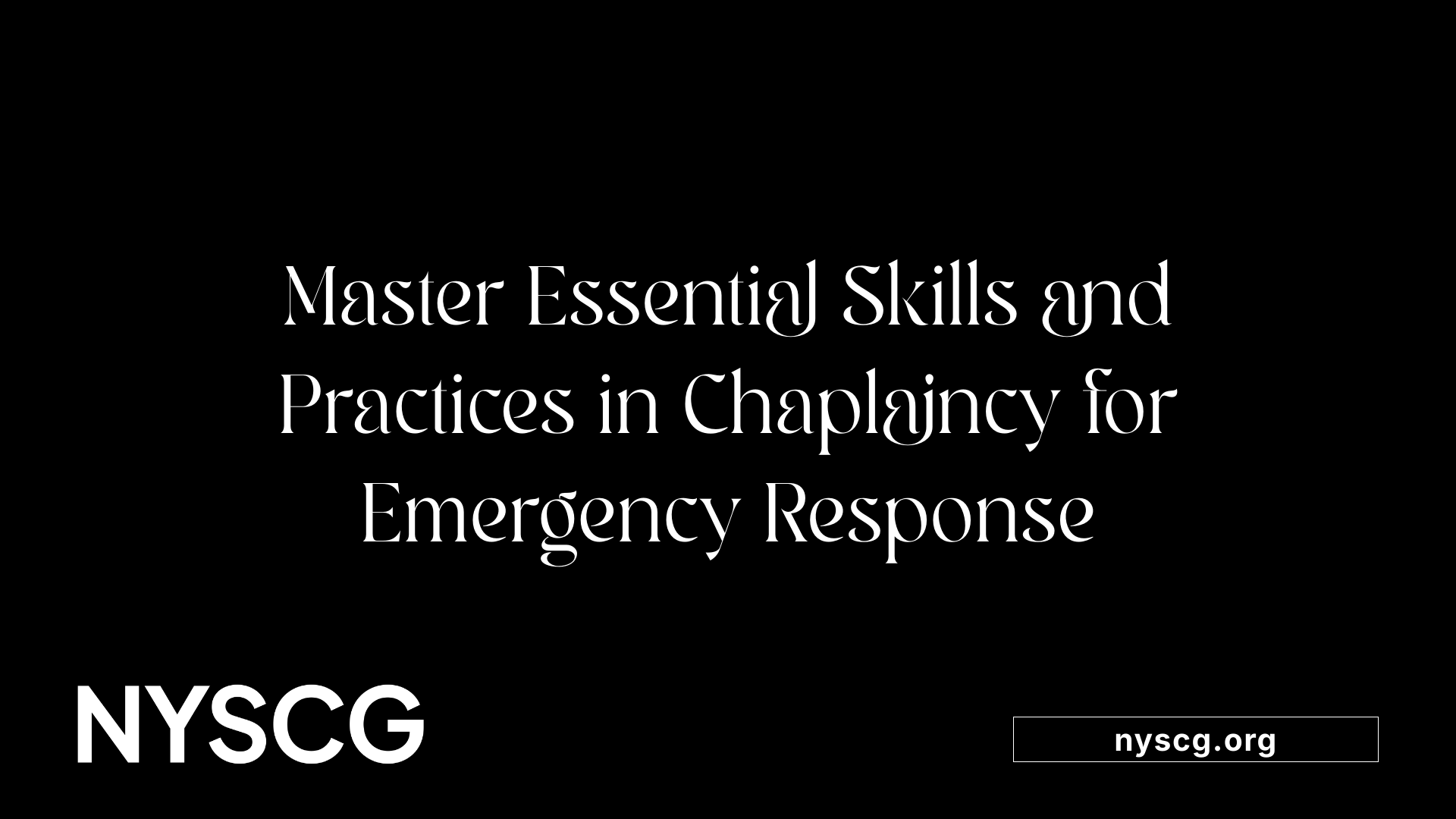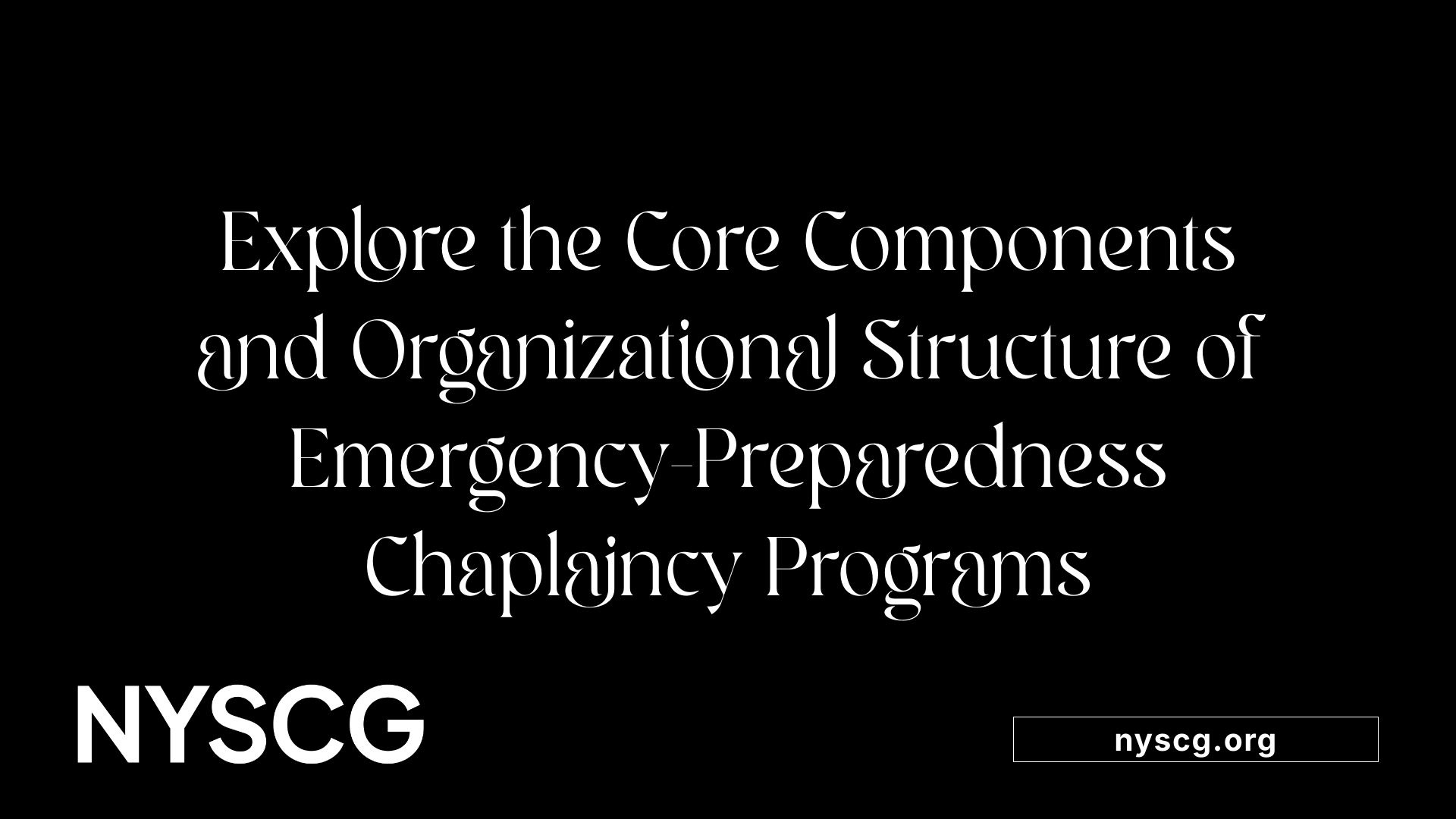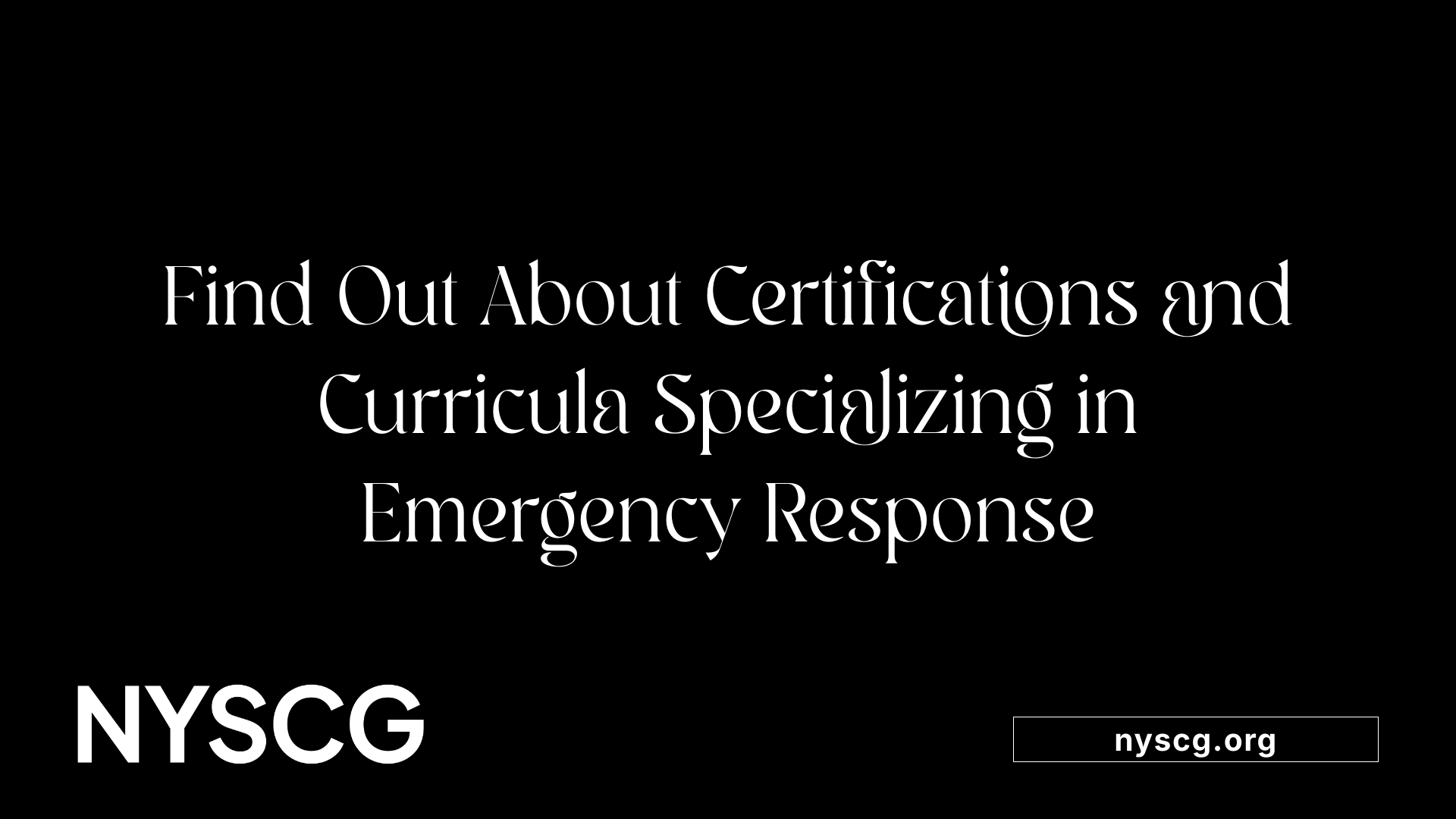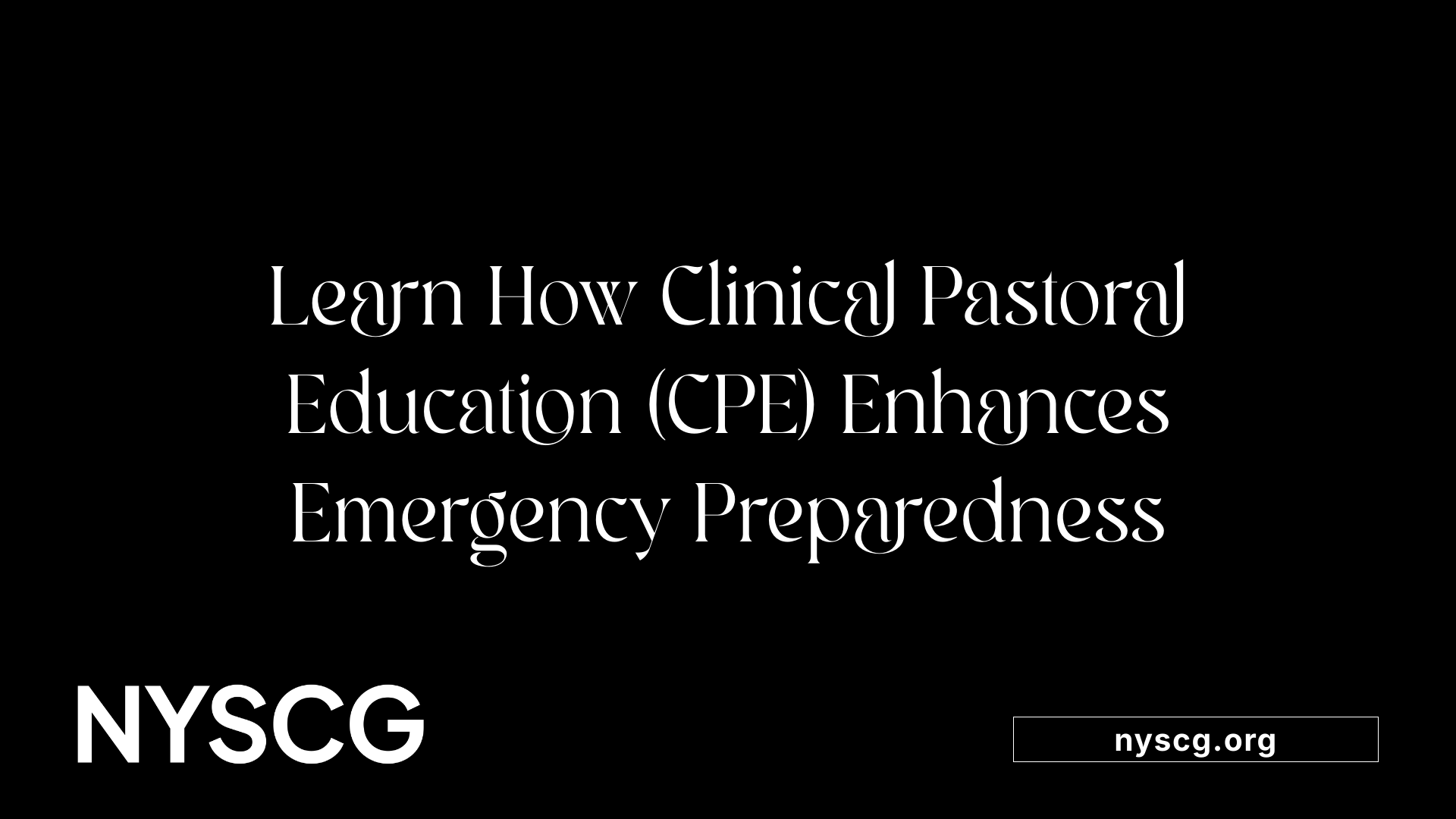How Chaplaincy Training Prepares You for Real-Life Emergencies


Chaplains play a vital role in disaster and crisis scenarios, providing emotional, spiritual, and psychological support to those affected. Comprehensive chaplaincy training ensures they are equipped with the necessary skills, knowledge, and certifications to respond effectively to real-life emergencies, from natural disasters to active shooter incidents. This article explores how training programs prepare chaplains for these challenging situations, emphasizing practical skills, interdisciplinary collaboration, and resilience-building.

Chaplaincy training focuses on a range of essential skills designed to prepare individuals for the high-pressure environment of emergencies and crises. These skills include crisis intervention, trauma support techniques, and disaster spiritual care. Trainees learn how to provide immediate emotional and spiritual aid, helping victims, responders, and their families navigate challenging circumstances.
Courses such as the "Crisis, Trauma, and First Response" certificate program emphasize the importance of compassionate presence and practical support during natural disasters, active shooter incidents, and community crises. Participants are taught to assess situations quickly, offer psychological first aid, and apply critical incident stress management (CISM) techniques.
Specialized training modules cover death notification protocols, vital for communicating sensitive news respectfully and ethically. Chaplains are also trained in recognizing and managing their own emotional responses to trauma, fostering resilience and effective coping strategies.
Organizations like The Salvation Army and the USCC Academy provide comprehensive training that combines emotional, spiritual, and physical care. This prepares chaplains to serve effectively in diverse settings such as hospitals, emergency services, military environments, and community organizations.
The core of this training emphasizes empathy, active listening, and maintaining professional boundaries. It aims to equip chaplains not only with theoretical knowledge but also with practical skills to provide meaningful support, ultimately making a tangible difference in the lives of those impacted by calamities.
Skill/PracticeDescriptionApplication AreaCrisis InterventionRapid response to individuals in immediate distressNatural disasters, accidentsTrauma Support TechniquesProviding emotional stabilization and ongoing supportHospital settings, post-incident careDisaster Spiritual CareAddressing spiritual needs during catastrophic eventsCommunity crises, war zonesPsychological First AidImmediate psychological support to trauma victimsMass casualty events, shootingsCritical Incident Stress Management (CISM)Guidelines for stress debriefing and resilience buildingFirst responders, rescue teamsDeath Notification SkillsEthical and compassionate communication of deathPolice, military, hospital cases
This comprehensive training aims to develop not only technical competencies but also emotional intelligence, cultural sensitivity, and ethical judgment vital for effective emergency response. Chaplains trained in these areas are better prepared to be a calming presence and a source of hope amid chaos.
For more detailed information or to explore specific training programs, search using phrases like 'chaplaincy emergency skills training,' 'trauma support in crisis,' and 'crisis intervention courses.'

Chaplaincy training programs focusing on emergency preparedness are carefully designed to equip spiritual caregivers with the skills necessary to respond effectively during crises and disasters. These programs typically feature a well-organized curriculum structured around core learning modules and practical training exercises.
The foundational components include courses in crisis intervention, grief counseling, mental health support, and ethics in emergency scenarios. These modules provide chaplains with essential knowledge to support individuals facing traumatic events, such as natural disasters, mass casualties, or community crises.
A significant aspect of the training involves immersive simulations and real-life drills. These practical exercises allow chaplains to apply their classroom learning in controlled environments, helping them develop quick decision-making skills and effective communication under pressure.
Interdisciplinary frameworks like the Incident Command System (ICS) are integral to the curriculum. Training within these models enables chaplains to operate seamlessly alongside first responders, medical teams, and emergency management agencies, ensuring coordinated and efficient responses.
Specialized modules address various facets of disaster response, including psychological first aid, death notifications, line-of-duty death support, and active shooter responses. These courses prepare chaplains to handle unique situations with sensitivity, professionalism, and competence.
Ongoing professional development is emphasized through certifications such as Disaster Chaplain Certification, Diploma in Spiritual Care, and Supervisor Certification. These credentials foster leadership, advanced skills development, and recognition of expertise in crisis situations.
Furthermore, modern programs incorporate modules on self-care, resilience building, and burnout prevention. Recognizing the demanding nature of emergency work, these courses promote mental well-being among chaplains, ensuring they remain effective helpers in times of community distress.
The structure also emphasizes adaptability for deployment across various settings—from local community organizations to national and international disaster efforts. Certification and accreditation from professional bodies validate the comprehensive nature of these programs.
In summary, chaplaincy training for emergency preparedness combines theoretical knowledge, practical exercises, interdisciplinary cooperation, and professional growth paths to prepare compassionate, competent, and resilient spiritual caregivers ready to serve during crises.

Chaplaincy training plays a vital role in equipping individuals to respond effectively during emergencies. It ensures that chaplains are prepared to provide comprehensive support that touches on spiritual, emotional, and psychological aspects of those affected by crises.
During a disaster or traumatic event, people often experience overwhelming feelings of grief, fear, and stress. Trained chaplains can offer a compassionate presence—listening actively, providing prayer or spiritual comfort, and guiding individuals through their emotional turmoil. This ability to connect on a human level fosters resilience, offering hope and reassurance in the darkest moments.
The training enables chaplains to understand and respond to diverse backgrounds and unique needs. Whether assisting first responders, victims, or families, they use trauma-informed care techniques that help reduce anxiety and de-escalate tension. Many chaplains work alongside mental health professionals, complementing mental health services and ensuring that those in crisis receive holistic and accessible support.
Chaplains are also trained in specific emergency protocols, such as performing death notifications with dignity, providing response to active shooter incidents, and managing stress during large-scale disasters. Their role often involves delivering religious support, but also includes practical interventions like psychological first aid and crisis intervention.
Having well-prepared chaplains on the frontlines significantly enhances the capacity of emergency services to serve the community. They serve as liaisons, advocates, and spiritual guides, embodying Christ’s love and compassion in times of need. This not only helps individuals cope with immediate trauma but also fosters long-term healing and community resilience.
In short, chaplaincy training ensures that during emergencies, support is accessible, compassionate, culturally competent, and faith-affirming. This comprehensive approach can mitigate some of the most profound effects of disasters and traumatic incidents, helping victims and responders find hope and strength amid chaos.
Chaplaincy training plays a vital role in equipping individuals with the tools necessary to effectively serve in emergency and crisis situations. It emphasizes the development of skills in emotional and spiritual care, crisis mitigation, and clear communication in high-pressure environments.
One major aspect of this preparation involves coursework and seminars that delve into trauma impact, stress management, and disaster response procedures. For example, organizations like I.F.O.C. and the Billy Graham Rapid Response Team offer specialized programs that focus on understanding the diverse effects of trauma on individuals and communities. These courses cover cognitive, behavioral, social, and emotional responses to crises, enabling chaplains to deliver compassionate and appropriate support.
Training programs often include modules on Psychological First Aid, Critical Incident Stress Management, and Death Notifications. These modules help chaplains learn how to quickly assess needs, provide immediate emotional support, and guide survivors and responders through the aftermath of traumatic events.
Experience-based training is equally crucial. Practical engagement through field education, such as working with trauma victims, participating in simulation exercises, or supporting community response teams, enhances real-world skills. Many certification pathways require direct care experience, ensuring chaplains are ready to face actual emergencies.
Workshops and seminars complement classroom learning by offering focused sessions on grief, loss, and crisis intervention strategies. These interactive formats allow chaplains to learn from experts, share best practices, and refine their skills in a supportive environment.
Collaboration with mental health and emergency agencies is another essential element. Chaplains often work alongside paramedics, firefighters, counselors, and law enforcement, gaining insights into interdisciplinary response protocols. This teamwork ensures a comprehensive approach to crisis care.
Finally, certification and credentialing processes validate a chaplain’s training and readiness. These typically involve passing exams on emergency protocols, trauma response techniques, ethics, and confidentiality, along with supervised field placements. Achieving formal recognition, such as the Associate Chaplain Certification or board certification from professional organizations, solidifies a chaplain’s qualifications.
Overall, chaplaincy training combines academics, experiential learning, interdisciplinary collaboration, and formal certification to produce highly capable crisis responders. Such thorough preparation enables chaplains to serve effectively during natural disasters, community crises, and large-scale emergencies.
AspectDetailsExamples & CertificationsSpecialized CourseworkTrauma impact, stress management, disaster response, death notificationsCritical Incident Stress Management (CISM), Psychological First Aid, Faith-based trauma coursesField ExperienceDirect trauma care, simulation exercises, community response supportClinical Pastoral Education (CPE), Military trauma care units, hospital placementsWorkshops & SeminarsGrief, loss, crisis intervention, stress resilience trainingTrauma seminars, disaster preparedness workshopsCollaboration with AgenciesWorking with mental health, emergency services, law enforcementJoint training programs, interdisciplinary drillsCertification & CredentialingExams, supervised practice, professional assessmentsAssociate Chaplain Certification, BCC (Board Certified Chaplain)
This comprehensive training ecosystem ensures chaplains are well-prepared to address the multifaceted needs of victims, responders, and communities during crises, ultimately strengthening emergency response efforts across various sectors.
Chaplaincy training plays a vital role in preparing individuals to handle the intense emotional and spiritual demands of crisis situations. It provides practical tools such as Spiritual and Psychological First Aid, Critical Incident Stress Management (CISM), and stress reduction techniques. These tools help chaplains respond swiftly and effectively during emergencies, whether they're natural disasters, community crises, or traumatic events involving first responders.
Courses like 'Sharing Hope in Crisis' focus on developing emotional resilience, teaching chaplains how to maintain their mental health while supporting others. Specialized training for law enforcement, fire services, hospitals, and military settings emphasizes essential skills such as effective communication, trauma debriefing, and peer support. This comprehensive approach ensures chaplains can serve as calm, compassionate presences amid chaos.
In addition to skills training, the emphasis on spiritual maturity helps chaplains draw strength from their faith and biblical principles, which can be shared to foster hope and healing. The ministry of presence—being available and attentive—is a cornerstone of their support work during critical moments.
Ongoing education through partnerships with organizations like the International Critical Incident Stress Foundation (ICISF) and Manna University ensures chaplains stay skilled in emerging crisis management techniques. These collaborations offer advanced courses on disaster response, resilience building, and mental health, further enhancing their ability to serve effectively.
By integrating behavioral health sciences, emotional intelligence, and trauma-informed care into their training, chaplains develop a well-rounded capacity for crisis management. Their preparedness is strengthened by hands-on experiences, simulated emergency deployments, and continuous learning. This blend of practical skill and spiritual support creates a resilient, adaptive chaplaincy capable of addressing complex crises in diverse settings.
Stress reduction techniques like mindfulness, breathing exercises, and self-care routines help chaplains maintain their well-being.
Spiritual resilience practices include prayer, meditation, and community engagement, forming a foundation for emotional stability.
Trauma debriefing and peer support are integral, providing safe spaces for chaplains and community members to process trauma and share coping strategies.
Building emotional endurance involves resilience exercises, reflection, and mentorship programs, reinforcing their capacity to endure and serve through adversity.
Continuous education and partnership organizations such as ICISF, Federation of Fire Chaplains, and military training centers ensure that chaplains stay updated with the latest crisis intervention techniques and best practices. These collaborations facilitate specialized training modules, certification opportunities, and peer networks that bolster crisis readiness.
AspectTraining MethodsOutcomesStress ReductionMindfulness, breathing, self-care routinesMaintains personal well-being during high-stress eventsSpiritual ResiliencePrayer, meditation, community involvementStrengthens internal coping mechanismsTrauma SupportDebriefings, peer support, trauma-informed carePromotes healing and effective crisis interventionEmotional EnduranceResilience exercises, mentorship, reflectionBuilds stamina and mental strength for ongoing serviceContinuous EducationPartnerships with ICISF, military, NGOsKeeps skills current and relevant in crisis situations
As these training elements become integral to their practice, chaplains are better equipped to foster resilience within communities. Their ability to provide spiritual guidance, emotional support, and trauma care ensures they remain effective front-line responders during emergencies.

Yes, numerous specialized programs and certifications are designed to prepare chaplains for emergency and crisis situations. These curricula focus on equipping chaplains with vital skills to support individuals and communities during disasters, accidents, or violent incidents.
One of the prominent training organizations is the United States Christian Church (USCC) Academy, which offers tailored courses that combine biblical counseling, crisis intervention, and emergency response techniques. Their programs include chaplain volunteer certifications and modules in Psychological First Aid (PFA) and Critical Incident Stress Management (CISM). These courses emphasize active listening, emotional stabilization, and crisis de-escalation.
The First Responders Chaplain - Special Unit is another notable program. It integrates FEMA (Federal Emergency Management Agency) training, including modules such as ICS 100 and 200, which are foundational for incident command and disaster response operations. These courses help chaplains understand the operational aspects of emergency management and improve coordination with first responders.
Clinical Pastoral Education (CPE) is widely used in emergency response training. Over four units of CPE, chaplains gain hands-on experience in hospitals, fire departments, police units, and military settings. CPE emphasizes self-awareness, emotional intelligence, and practical pastoral care skills in trauma scenarios.
Military and government agencies also maintain their own certification standards. The Department of Defense, for example, offers specialized training at military medical centers, focusing on serving service members on the battlefield or in military hospitals. Advanced certifications like the Army’s “7 Romeo” designation require completing four units of CPE and include experience with trauma, suicide prevention, and behavioral health support.
Organizations such as the Federation of Fire Chaplains and the Police Chaplain Program provide additional training in death notifications, line-of-duty death responses, and officer-involved incident debriefing. These curricula emphasize ethical considerations, confidentiality, and cultural competencies essential in diverse emergencies.
Overall, these specialized certifications and curricula ensure that chaplains are well-prepared to serve effectively in high-pressure emergency situations, with modules tailored to different environments and incident types.
Certification/ProgramFocus AreaDescriptionRelevant Modules or ComponentsUSCC Academy CertificationsEmergency response & crisis interventionCombines biblical counseling, PFA, CISMFEMA ICS 100/200, trauma supportFirst Responders Chaplain ProgramDisaster and trauma responseIncludes Psychological First Aid, CISMFEMA modules, practical trauma careClinical Pastoral Education (CPE)Trauma in healthcare, military & communityHands-on field training, emotional intelligenceStress management, trauma debriefingMilitary Certification (Army '7 Romeo')Military trauma & behavioral healthSupervised CPE, leadership in crisesCombat trauma, suicide preventionFire & Police Chaplain ProgramsLaw enforcement & fire service crisesDeath notifications, officer supportEthics, confidentiality, cross-cultural
These programs collectively build a comprehensive skill set for chaplains dedicated to emergency and disaster response, ensuring they can provide emotional, spiritual, and practical support in the most challenging situations.
Chaplaincy programs play a vital role in enhancing emergency response by offering crucial emotional and spiritual support during crises. Trained chaplains are often among the first responders to arrive at disaster sites, hospitals, or incident scenes, where their presence helps to stabilize emotional distress among victims, responders, and community members.
One of the primary advantages of chaplaincy involvement is the ability to de-escalate tense or chaotic situations. Chaplains use active listening and compassionate engagement to calm individuals in distress, thereby preventing further escalation of trauma or aggression. Their training in crisis intervention allows them to identify those at risk of severe trauma or suicide, providing immediate support and guiding them toward further help.
In addition to immediate crisis management, chaplains contribute significantly to mental health and trauma recovery. They assist individuals in processing grief and loss, which is common in disasters and tragic incidents. Their presence fosters a sense of hope and resilience, encouraging individuals to cope and recover emotionally.
Chaplaincy support also plays a role in reducing burnout among emergency responders. Responders often face high stress, emotional exhaustion, and secondary traumatic stress. Chaplains serve as a confidential resource, offering debriefings, spiritual care, and mental health support, which help responders maintain their well-being and continue their vital work.
Furthermore, chaplains help foster community trust and cohesion during difficult times. Their unbiased presence, rooted in empathetic service, encourages open communication and cooperation among various organizations, responders, victims, and families. This sense of community support and shared resilience reinforces social bonds and promotes a safer, more resilient environment.
In organizational settings, chaplains’ involvement contributes to a holistic approach to care. They often participate in incident command structures, providing spiritual support aligned with disaster response protocols. Their ability to connect with diverse populations through interfaith and cultural sensitivity makes them invaluable during large-scale emergencies.
In summary, the practical benefits of chaplaincy programs in emergencies encompass immediate emotional and spiritual stabilization, de-escalation, mental health support, responder well-being, and community cohesion. Their professionalism and compassionate presence enhance the effectiveness and humanity of emergency responses, helping communities and individuals navigate through trauma and toward recovery.

Clinical Pastoral Education (CPE) is a specialized training that focuses on developing pastoral care skills through experiential learning. It emphasizes self-awareness, emotional intelligence, and resilience, equipping chaplains and spiritual caregivers to handle crises effectively.
During CPE, students engage in supervised field experiences that involve real-world interactions with individuals facing trauma, grief, or severe distress. These experiences are often conducted in settings such as hospitals, military medical centers, prisons, or community crisis centers.
A pivotal part of CPE is learning to remain present with those in distress, offering emotional and spiritual support in the midst of chaos. The training helps participants understand their own emotional responses and develop coping strategies, essential for stress management during emergencies.
One of the critical contributions of CPE to emergency preparedness is the integration of behavioral health sciences. This involves understanding behavioral responses to trauma, recognizing signs of emotional distress, and applying therapeutic techniques grounded in behavioral health principles.
Chaplains trained through CPE are skilled in trauma care, including crisis intervention, de-escalation, and providing psychosocial support. This hands-on trauma care experience enables them to serve effectively during natural disasters, pandemics, or large-scale accidents.
Furthermore, CPE's emphasis on self-awareness and emotional intelligence nurtures resilience. Resilience is fundamental for supporting communities during prolonged crises, including natural disasters or widespread health emergencies.
The program also prepares chaplains to support holistic community resilience by addressing not just physical needs but also emotional and spiritual well-being. They are trained to implement spiritual care strategies that bolster community morale and foster recovery.
In military contexts, CPE helps service members and chaplains work together in trauma situations, enhancing team cohesion and response effectiveness. This is especially important in combat zones or disaster response operations where rapid, compassionate action is vital.
TopicDescriptionRelevance to Emergency ResponseSelf-awareness and emotional intelligenceTraining focused on understanding one's emotional state and reactionsBetter stress management and compassionate engagementHands-on trauma care experienceDirect involvement in crisis situations during trainingPractical skills for real-world trauma responseIntegration of behavioral health sciencesApplying psychology and mental health principles in pastoral careEnhanced support for mental health needs during crisesSupporting holistic community resilienceStrategies to strengthen community spiritual and emotional well-beingFosters long-term recovery and stability
CPE serves as a vital component of comprehensive emergency preparedness for chaplains and spiritual caregivers. By emphasizing self-awareness, trauma care, behavioral sciences, and community resilience, CPE ensures that spiritual support is a fundamental part of disaster and crisis response efforts. This holistic approach improves service quality and helps communities recover more effectively from traumatic events.
For further information, explore keywords such as clinical pastoral education, emergency preparedness, and trauma care training. These areas continue to evolve, integrating new insights into trauma psychology and emergency response protocols, making CPE an indispensable element in modern crisis management.
In sum, comprehensive chaplaincy training programs aim to prepare individuals to respond with competence, compassion, and resilience in the face of crises. By combining theoretical knowledge, practical simulations, interdisciplinary collaboration, and specialized certifications, chaplains are equipped to meet the complex demands of emergency situations. Their role in providing holistic care, mental health support, and emotional resilience is invaluable during disasters, active shooter events, and community crises. As emergency landscapes evolve, ongoing education and certification ensure that chaplains remain prepared, capable, and confident in their vital contributions to crisis response.
All you need is the will to make the world a better place.
New York State chaplain group inc. is a tax deductible organization with a federal tax Id number 92-383-4921